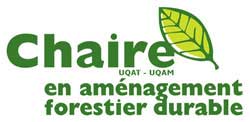Projet de recherche : Landscape-scale spatial modeling of the organic layer thickness and soil properties in paludified forests
Baburam Rijal, Luc Lebel, David L. Martell, Jean-Martin Lussier, Frédérick Raulier , Sylvie Gauthier. (2018). Value-added forest management planning: A new perspective on old-growth forest conservation in the fire-prone boreal landscape of Canada. For. Ecol. Manage.. . 10.1016/j.foreco.2018.06.045 lien
Baburam Rijal, David L. Martell, Sylvie Gauthier, Frédérick Raulier . (2018). The economic impact of fire management on timber production in the boreal forest region of Quebec, Canada. International Journal of Wildland Fire. 27(12):831-844. 10.1071/WF18041 lien

